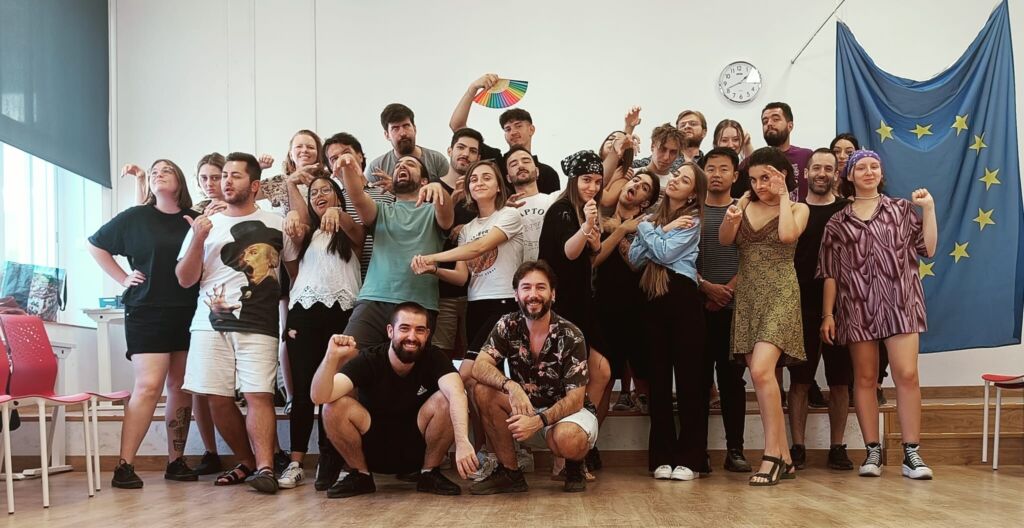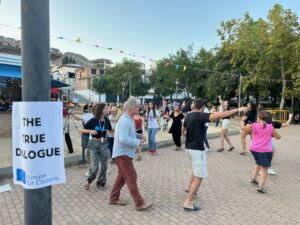Europe is facing an increasing number of populist, xenophobic and nationalist movements that mix racism and intolerance in order to increase Euroscepticism and normalize hate in public opinion.
Stereotypes and prejudices based on general ignorance of reality target immigrants and minorities, with an important role of fake news, to justify anti-democratic and violent actions. This situation has a boom in the crisis we live in and puts at risk social cohesion.
And as the Action Plan against Disinformation of the European Commission indicates, greater public awareness is essential for improving societal resilience against the threat that disinformation poses. Therefore, we implemented a project involving citizens and NGOs from 4 countries (Germany, North Macedonia, Poland and Spain) in order to improve active citizenship and intercultural dialogue with the following objectives:
-Analyze the types of hate speech faced by immigrants and minorities mainly through fake news, with special focus on those linked with Euroscepticism;
-Create and train local teams to fight the hate speech mentioned, which in turn train more people in the community and raising awareness about the topic;
-Promote intercultural dialogue and active and engaged citizenship.
To achieve them, the project included several actions:
Preparatory activities: the activities involved 16 participants, 4 participants per country.
Location/ Dates: The event took place in Krakow (Poland), Kumanovo (North Macedonia), Osterholz-Scharmbeck (Germany) and Granada (Spain), from 31/10/2021 to 31/08/2022.
Short description: This process leaded us to build the necessary foundations for a correct and quality implementation of the project. During the months of preparation we focused mainly on: implementation of coordination tools between partners; creation of local work teams; establishment of internal work structures; contact with stakeholders; creation of networks and media to make the project visible and disseminate the results; general project planning.
Preparatory meeting: the activity involved 5 participants.
Location/ Dates: Granada (Spain), from 19/04/2022 to 21/04/2022
Short description: these activity consisted of a transnational meeting with one person from each partner (two in the case of Las Niñas del Tul) to establish general coordination of the project. The participants were those in charge of the project in each of the organizations. It was a technical coordination meeting to establish the final definition of the agreements and detailing all the conditions.
3 events have been carried out within this project:
Event 1
Participation: The event involved in the training of multipliers 69 citizens, including 21 participants from the city of Krakow (Poland), 19 participants from the city of Kumanovo (North Macedonia), 8 participants from the city of Osterholz-Scharmbeck (Germany) and 21 participants from the cities of Íllora and Granada (Spain).
Location/ Dates: The event took place in Krakow (Poland), Kumanovo (North Macedonia), Osterholz-Scharmbeck (Germany) and Granada (Spain), from 01/12/2021 to 20/10/2023.
Short description:We implemented in each country a local research about the hate speech faced by immigrants and minorities mainly through fake news, with special focus on those linked with Euroscepticism. We worked on two lines, on the one hand with the citizens and on the other hand with legal persons/administrations, experts and journalists reflecting their professional experience. To do this, we conducted surveys, interviews and focus groups, collected existing documentation and collaborated with other actors working on the subject. Once the local group of multipliers has been selected and based on the research, training was given to capacitate them on fighting against the situation of disinformation and discrimination. Different methodologies, especially non-formal education and learning by doing, were used to ensure putting into action from the beginning. They also were trained to share this knowledge and train other people, to multiply the process and create a bigger net of supporters. Local groups trained more people with different training actions in all the countries involved to support our message. They also created a counter-information campaign of the most widespread fake news. The campaign involved a continuous update during the months of the project to „bury” in our regions that fake news with rigorous content and based on objective data.
 =
=
Event 2
Participation: The event involved 29 citizens, including 9 participants from Poland, 6 participants from North Macedonia, 3 participants from Germany and 11 participants from Spain.
Location/ Dates: The event took place in Granada (Spain), from 02/09/2022 to 06/09/2022.
Short description: We implemented a 5 days residential meeting with participants from the four countries. They were people who would be in charge of implementing the project in the different areas. We used an active and participatory methodology, where the participants were the protagonists and peer learning was the priority. It was based on the holistic nature of the learning, involving not only cognitive or intellectual approaches, but also encompasses emotional and attitudinal approaches.

Event 3
Participation: In the organization of the event activities, they were involved 153 citizens, 37 participants from the city of Krakow (Poland), 31 participants from the city of Kumanovo (North Macedonia), 53 participants from the cities of Osterholz-Scharmbeck and Bremen (Germany) and 32 participants from the province of Granada (Spain).
Location/ Dates: The event took place in Krakow (Poland), Kumanovo (North Macedonia), Osterholz-Scharmbeck and Bremen (Germany) and Granada Province (Spain), from 01/06/2022 to 20/10/2023.
Short description: During the period of the project, and to complete the other events, we organized diverse activities to promote intercultural dialogue and active and engaged citizenship. We organized more than 40 different activities, and around 32 people per country were in charge of organizing them (and many more people participated). The activities had different formats: debates, festivals, human libraries, exhibitions, art workshops, storytelling, conversation in different languages, NGOs fairs, etc.

Indirectly the project reached 60.000 people through debates, socio-cultural activities, media outreach and social media, promotional materials…
The key result was a citizen-empowered movement to promote intercultural dialogue and European values.
The project «The True Dialogue» was funded with the support of the European Union under the Programme „Europe for Citizens”


